- Home
- Margaret Pemberton
The Summer Queen
The Summer Queen Read online
The Summer Queen
MARGARET PEMBERTON
Contents
PART ONE: VOWS
Chapter One
Chapter Two
Chapter Three
Chapter Four
Chapter Five
Chapter Six
Chapter Seven
Chapter Eight
Chapter Nine
Chapter Ten
Chapter Eleven
Chapter Twelve
Chapter Thirteen
PART TWO: HOPES
Chapter Fourteen
Chapter Fifteen
Chapter Sixteen
Chapter Seventeen
Chapter Eighteen
Chapter Nineteen
Chapter Twenty
Chapter Twenty-One
Chapter Twenty-Two
Chapter Twenty-Three
Chapter Twenty-Four
PART THREE: CHOICES
Chapter Twenty-Five
Chapter Twenty-Six
Chapter Twenty-Seven
Chapter Twenty-Eight
Chapter Twenty-Nine
Chapter Thirty
Chapter Thirty-One
Chapter Thirty-Two
PART FOUR: THE DARKEST NIGHT AND THE GLORIOUS DAWN
Chapter Thirty-Three
Chapter Thirty-Four
Chapter Thirty-Five
Chapter Thirty-Six
Chapter Thirty-Seven
Chapter Thirty-Eight
Chapter Thirty-Nine
Chapter Forty
Chapter Forty-One
Acknowledgements
Select Bibliography
For my much-loved husband,
Mike, in the year of our Golden Wedding
PART ONE
VOWS
Chapter One
AUGUST 1879, OSBORNE HOUSE
Queen Victoria’s favourite summer residence stood on a high knoll overlooking the narrow sea channel separating the Isle of Wight from mainland England. Designed by her late beloved Albert, it had been built in the style of an Italian Renaissance palace and, with its cool spaciousness, cream-stone colonnades and balustraded terraces looking out over rolling lawns and light woodland to the glittering expanse of the sea, it was the perfect setting for family gatherings.
The gathering now taking place was one that Victoria held annually in the last week of August, for 26 August had been her beloved Albert’s birthday. Much to the relief of the vast number of children and grandchildren that the Dear Beloved had left behind him, and whose presence at Osborne was compulsory, the 26th had now come and gone. The mood had lightened and the English, Danish, German – and, in one instance, Russian – sides of the family were all enjoying catching up with each other’s news.
The day was blissfully hot and a light breeze from the sea was gently stirring the needles of a giant cedar. At the centrepiece of an immaculately manicured lawn on which a score of elegantly dressed couples were strolling, and where children were playing, the wide-spreading branches were giving shade to the Queen, who, small and squat and dressed entirely in black, was seated in a bath chair.
As always at the August get-together, the Queen was taking the opportunity of conducting a series of one-to-one in-depth chats with those members of her family who were approaching the age when a dynastic marriage for them needed arranging.
May Teck, who was twelve and too young for such a tête-à-tête, watched from a safe distance as sixteen-year-old Princess Victoria of Hesse and by Rhine was seated next to the bath chair while the Queen embarked on what, in her eyes, was a very necessary grandmotherly interrogation.
Hoping it would also be a gentle one, for Vicky’s mother had died only eight months earlier, May scanned the lawn in the hope of catching sight of Vicky’s slightly younger sister, Ella, and her much younger sister, seven-year-old Alicky.
Their bereaved father was standing nearby in conversation with the Prince of Wales. All children in the family referred to the adults as either Aunt or Uncle, no matter what their actual relationship to them was. So although the Prince of Wales was her second cousin, to May he was ‘Uncle Wales’ because of the age difference between them, just as the Queen was ‘Aunt Queen’.
Uncle Wales was one of her least favourite people, because he chaffed – teased in a way that was unkind. Not wanting to draw his attention, May moved away, walking across to where, at a white-clothed table, her mother, Princess Mary Adelaide – known by her royal title as the Duchess of Teck – was indulging her passion for cream cakes in the company of the Princess of Wales. Although May always went out of her way to avoid her Uncle Wales, she adored his graceful, stylish Danish wife, Alix.
‘Why are you on your own, May?’ Alix asked, with the gentle smile that had won not only the hearts of the family she had married into, but those of her new country as well. ‘My little chicks would love to be spending time with you.’
The little chicks in question – twelve-year-old Louise (always known as Looloo), eleven-year-old Victoria (known as Toria, to differentiate her from all the other Victorias in the family) and nine-year-old Maud – were a little distance away, sitting on a blanket and arguing over a game of Jacks.
May didn’t find the thought of joining them enticing. Not when, only minutes ago, Toria had pointed out to her that she lacked the pedigree that she, Louise and Maud possessed.
‘A Serene Highness is far less royal than a Royal Highness,’ she had said, annoyed that May had beaten her at Halma. ‘You’ll never be a country’s queen, but I will, and so will Looloo and Maudie.’
‘No, I won’t,’ Maudie had said, resetting the Halma board. ‘I’m going to marry May’s brother, Frank.’
‘But Frank’s also a Serene Highness, you silly girl,’ Toria had said, exasperated. ‘Don’t you know anything, Maudie?’
‘I don’t know very much,’ Maudie had admitted, ‘but I do know that Frank is the nicest and best person in the whole wide world.’
May, the only girl in a family of four, was well practised at peace-making and, aware that Toria’s annoyance with Maudie was now close to the hair-pulling stage, she’d said hurriedly, ‘I don’t care that I’m not likely to marry the heir to a throne, Toria. I just want to marry someone who loves me.’
‘And who you are in love with,’ Maudie had said. Out of the three Wales girls, she was the only one May regarded as a genuine friend. ‘That’s very important, May. And now is this next game of Halma going to be you and me against Toria and Looloo? And if it is, which pawns do you want to play with? I’m taking the blue, because blue is my lucky colour.’
Remembering the incident, May said now, ‘I’ll come back a little later and play Jacks, Aunt Alix. For the moment, I’m looking for Ella and Alicky. You don’t know where they are, do you?’
Although only in her mid-thirties, the Princess of Wales was deaf and, when she looked blank, May’s mother, guessing the question hadn’t been heard clearly, helpfully answered for her, saying, ‘As they’re nowhere in sight, May, they will probably be on the beach.’
‘Oh yes, of course, Mama. Thank you.’ The suggestion was so obvious that May couldn’t think why she hadn’t thought of it for herself.
Blowing a kiss to her mother and Alix, and giving the Wales girls and their blanket a wide berth, she began heading across the lawn in the direction of the wooded walk that led down to a private stretch of seashore. It took her a little while to reach the trees, for she had to weave her way between little knots of relatives, the men formally dressed despite the heat, the women a sea of colour in trailing silk gowns worn over bustles to give them a fashionable, swan-like S-shape.
She was so busy skirting around the Crown Prince and Crown Princess of Prussia that she accidentally bumped in
to one of her aunts.
‘Do look where you are going, May,’ her Russian-born Aunt Marie said, with an air of long-suffering patience. ‘You’re too gawky to wander around with your eyes closed. One of these days you’ll injure someone.’
Aunt Marie had a carrying voice, and fourteen-year-old Georgie Wales, who was standing nearby with his older brother Eddy, cracked with laughter.
May, conscious of how tall she was for her age, felt her cheeks flush scarlet.
‘I’m sorry, Aunt Marie,’ she said, wishing Georgie and Eddy – particularly Eddy − a million miles away. ‘I’ll take more care in future.’
Her aunt gave a nod of her head to indicate she had accepted the apology, then moved her lace-edged parasol from one shoulder to the other and returned her attention to the sister-in-law she had been speaking to.
‘Nice work, May,’ Georgie said, highly amused. ‘You nearly knocked down an Imperial Highness.’
May, who had forgotten that Aunt Marie was the only daughter of the Tsar of Russia, said crossly, ‘Yes, I did, didn’t I? And me only a Serene Highness – something your sister Toria has just left me in no doubt about, and which I don’t need to have pointed out a second time, thank you very much.’
‘No need to be touchy. It’s not your fault. You can’t help not being ebenbürtig and of equal birth. Do you fancy a game of croquet?’
‘No.’ The blood had drained from May’s face. No one, absolutely no one, ever mentioned the word ebenbürtig to her. Even Toria, when pointing out that May stood no chance of ever marrying an heir to a royal throne, hadn’t done so. To have referred so bluntly to the stain in her father’s lineage would – even for someone as insensitive as Toria – have been a step too far. In a shaky voice she added, ‘I don’t want to play croquet with you, Georgie Wales. I don’t think I shall want to play croquet or anything else with you, ever again.’
She pushed past him, painfully aware of Eddy having been a witness to her humiliation. When she was safely a good half-dozen yards away she slowed down and looked behind her.
Both Wales boys were standing perfectly still, staring after her, Georgie in comical mystification, Eddy inscrutably – the fashionable way he was dressed making the near two-year difference between him and Georgie seem years greater than it actually was. As his dark eyes met hers, May’s heart began to thud and she whipped her head back round so that he wouldn’t see the effect he had on her.
Even though she was the Wales children’s third cousin, she had always spent more time with them than she had with any of her other cousins. Marlborough House, the Wales family’s London home, was as familiar as her own home, which made Toria and Georgie’s remarks about her semi-royal status doubly distressing.
She began to give herself a good talking-to and, although still hurt and angry, her emotions came once again under tight control. If Georgie was going to grow up as insensitive of people’s feelings as his father, then there was nothing she could do about it. Eddy, thank goodness, was nothing like his father, although he was an enigma to everyone but his adoring mother. May knew one thing, where Eddy was concerned, and that was that he wasn’t insensitive. His sensitivity was one of the reasons she had such a crush on him – that and his mesmerizing gold-flecked eyes.
Just as she reached the thickest part of the woodland she was waylaid by a forlorn-looking Hélène of Orleans, the eight-year-old daughter of the Count of Paris. ‘The Parises’, as Queen Victoria always referred to Hélène’s family, lived in exile from France in Buckinghamshire and were accepted as being almost family.
‘I’m looking for Eddy,’ Hélène said, appearing to be on the verge of tears. ‘He said he would teach me how to whistle, but I can’t find him anywhere.’
‘He’s on the top lawn, with Georgie.’
‘Is he?’ Hélène’s face brightened. ‘Thank you ever so much, May.’ And she set off at a run in the direction of the house.
When May reached the bay, she was a little surprised to see that it was nearly empty. As there had been no sign of Ella and Alicky on any of Osborne’s lawns, she had supposed she would find them here with her brothers, but there were only two people in sight. One of them was Alicky, who was sitting in a huddle, crying; the other was their twenty-year-old German cousin Willy, who was squatting on his haunches, facing her.
Willy had a reputation for being a bully and, assuming him to be the cause of Alicky’s distress, May burst into an urgent sprint. It wasn’t until she was almost on top of them that she realized that, far from being unkind to Alicky, Willy was trying to comfort her.
‘Your mama is in heaven with the angels,’ he was saying as May floundered to a halt beside them. ‘She’s looking down on you and wants you to be happy, not sad.’
‘But it was my fault she died.’ Tears flooded Alicky’s cheeks. ‘Mine and Vicky’s and Irène’s and even Ernie’s.’
‘Of course it wasn’t!’ Appalled that Alicky should think such a thing, and wondering why Alicky hadn’t also thought Ella responsible for their mother’s death, May dropped to her knees on the sand and put an arm around her. ‘Darling Alicky, how on earth could your brother and sisters have been responsible for your dear mama’s death?’
Alicky’s face was ashen. ‘Because if she hadn’t nursed us when we had the diphtheria, she wouldn’t have caught it and wouldn’t have died.’
She hiccupped, the tears still falling.
Willy, whose mother was Alicky’s aunt and who knew all the details of his aunt’s death – and was aware that May clearly didn’t – said to May, ‘Just before Christmas, Vicky fell ill with diphtheria, and then Alicky, Marie, Irène and Ernest soon followed. Ella was spared, because she was staying with relatives. Despite the doctors’ and Aunt Alice’s nursing care, Marie couldn’t be saved, and then Aunt Alice caught it and died – and the way she died . . .’
He left the rest of his sentence unsaid, and May understood why. When someone died from diphtheria, they choked to death. Did Alicky know that was how her mother had died? If she did – even worse, if she had been nearby at the time – it was no wonder she was still so grief-stricken at the horror of it.
She tried in vain to think of some way of comforting or distracting Alicky, but couldn’t. May rarely felt out of her depth, but grief combined with guilt – no matter how irrational that guilt – was something totally outside her experience. To her great surprise, it was Willy – generally accepted as being the oddest of the many oddballs in the vast tribe of their family – who came to the rescue by bringing Alicky’s attention to the deformity that he usually went to huge lengths to hide.
‘Everyone has something terrible happen to them, Alicky.’ He indicated his foreshortened and withered left arm, with its abnormally small hand. ‘Look at this. This is because, when I was born, I came out all wrong.’
Alicky hiccupped again and stopped sobbing, her attention caught now. She didn’t quite know what he meant by ‘having come out all wrong’, because storks brought babies and she thought they would be careful about doing so. Like May, she had never previously known Willy to voluntarily remove his hand from one of his specially tailored jacket pockets and, as he did so now, she was riveted.
So was May.
Willy’s deformity would have been dreadful for anyone. For someone who was already a prince, and who would one day be Crown Prince and eventually Emperor, it was dreadful on a scale that was truly calamitous. Kings and emperors were not supposed to be disabled. They were supposed to be fine figures of men who rode on magnificent white horses at the head of glorious ceremonial parades, and Willy had horrendous difficulties with anything that needed balance and physical coordination.
Just as the rest of the male members of the family were in formal dress at an informal party, so was Willy, although in his case, because he was a lieutenant in the 1st Foot Guards, he was wearing military uniform. As Alicky seemed about to begin crying again, he quickly removed the glove on his left hand. His little paw was as white and flaccid as a
small, beached sea creature.
Alicky wiped her tears away. ‘Is it always like that? Does it ever move?’
‘Only if I move it with my good hand.’ To prove his point, he lifted it with his right hand and then let it fall, so that it once again lay inert on his thigh, the fingers clawed.
A seagull was circling around them, hopeful of food. May shooed it away. Alicky said with a perplexed frown, ‘Were you born like that, Cousin Willy? Or did it just happen to you, like catching diphtheria happened to me and Mama?’
Willy hesitated and May, whose mother chatted to her with no holds barred, wasn’t surprised. The story of Willy’s gory birth was not suitable for a sensitive seven-year-old. It had been what her mother had described as a ‘breech birth’, which apparently meant that he’d been born bottom-first. In the struggle to bring Willy into the world, the court physician used forceps and, in doing so, the ligaments and nerves in Willy’s left shoulder were hideously damaged, resulting in an arm that had never grown or functioned properly and which, for Willy, was a complete and utter catastrophe.
Alicky asked again, ‘Were you born like that, Cousin Willy, or did it just happen?’
Willy said, mercifully not elaborating, ‘I was born like this.’
A braid of red-gold hair had fallen forward over Alicky’s shoulder and she flicked it back. ‘Does it make you feel different from everyone else?’
Willy gave a mirthless laugh. ‘I’m as different as the Man in the Moon is from everyone else. How could I not be? Do you know how my grandfather refers to me? He calls me the “defective” prince. Even worse, my mother is of the same opinion. You have no idea of the tortures I had to endure as a child. All carried out not for my sake, but because having been brought up to believe herself perfect, my mother couldn’t bear to be seen as having given birth to a child so glaringly imperfect. She insisted that the arm had to be made good, no matter how much I suffered in the attempt.’
‘But how could it be made good?’ May knew it was indelicate to ask, but she couldn’t help herself. In all the family gatherings she had been to at Osborne, she had never previously had such an interesting time. ‘What could the doctors do?’

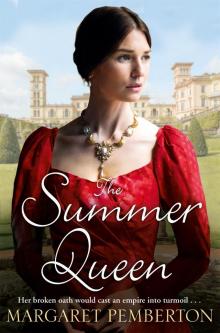 The Summer Queen
The Summer Queen Moonflower Madness
Moonflower Madness The Londoners
The Londoners The Flower Garden
The Flower Garden Yorkshire Rose
Yorkshire Rose Vengeance in the Sun
Vengeance in the Sun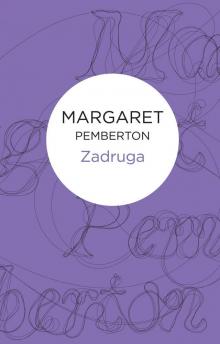 Zadruga
Zadruga Beneath the Cypress Tree
Beneath the Cypress Tree Magnolia Square
Magnolia Square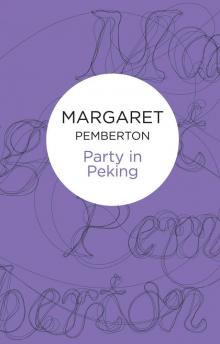 Party in Peking
Party in Peking Lion of Languedoc
Lion of Languedoc Forget-Me-Not Bride
Forget-Me-Not Bride The Guilty Secret
The Guilty Secret Rendezvous With Danger
Rendezvous With Danger A Season of Secrets
A Season of Secrets Silver Shadows, Golden Dreams
Silver Shadows, Golden Dreams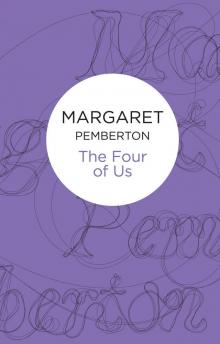 The Four of Us
The Four of Us Devil's Palace
Devil's Palace Never Leave Me
Never Leave Me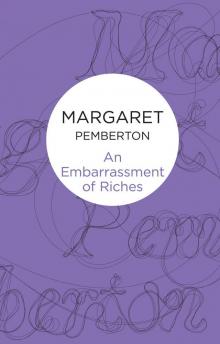 An Embarrassment of Riches
An Embarrassment of Riches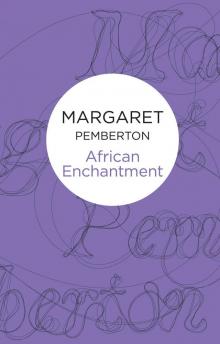 African Enchantment
African Enchantment White Christmas in Saigon
White Christmas in Saigon Coronation Summer
Coronation Summer A Multitude of Sins
A Multitude of Sins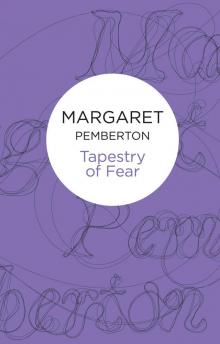 Tapestry of Fear
Tapestry of Fear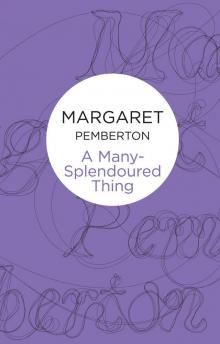 A Many-Splendoured Thing
A Many-Splendoured Thing